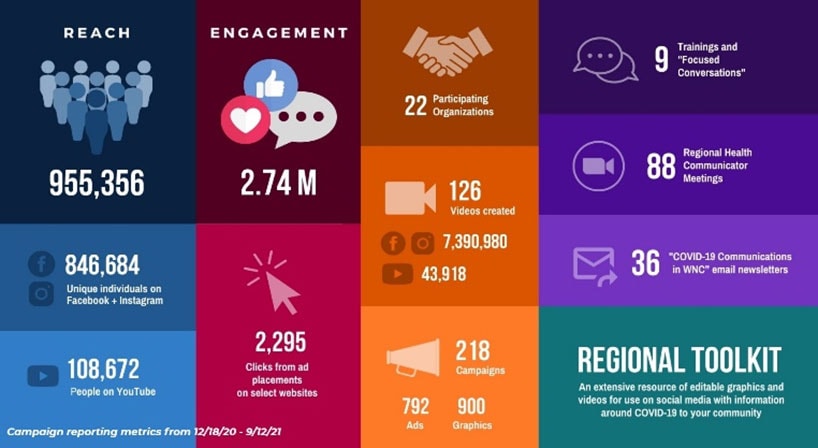“My Reason WNC” Regional COVID-19 Communications
Campaign in Western North Carolina
Western North Carolina, commonly referred to as WNC, is home to the picturesque Great Smoky Mountains National Park, record-setting Blue Ridge Parkway, and award-winning Museum of the Cherokee Indian. WNC’s 18 counties consist of many mountainous communities, ranging in population size of less than 5,000 to approximately 90,000 and serving almost 1 million residents. Despite its beautiful scenery, WNC is challenged with a limited health workforce, an ongoing opioid epidemic, and above-national-average rates of heart and lung diseases.
In 1995, a group of dedicated individuals began to identify, explore, and implement opportunities to collaborate with local and regional hospitals and healthcare systems with the goal of making WNC the healthiest place in the nation. This group of dedicated individuals formalized their alliance and created a non-profit organization, WNC Health Network.
The Work of WNC Health Network, a Collective Impact
Today, WNC Health Network is an alliance of stakeholders working together to create, improve, and support healthy and thriving communities in WNC. For the past decade they have also led a community health assessment collaborative between hospitals, public health agencies, and key regional partners, known as WNC Healthy Impact. “The WNC Healthy Impact collaborative really inspired us to examine how we work together as a region around health communications,” said Adrienne Ammerman, Communications Specialist for WNC Health Network and convener of the Western North Carolina Health Communicators Collaborative. “As peers, we saw the value in working in concert as health department public information officers and hospital communication marketing leads to address the key health issues affecting our communities and region.”
Regional Health Communicators Collaborative
In 2019, WNC Health Network organized a group of local hospital and health department-based health communicators, now known as the WNC Health Communicators Collaborative, to coordinate and create communications on priority health issues that affect WNC communities. As the WNC Collaborative began to shape its first regional health communication effort, COVID-19 appeared and caused significant strain on WNC communities. “Because the relationships and infrastructure to share ideas and make decisions was in place, the Collaborative quickly pivoted. We began having weekly virtual meetings to review COVID-19 resources from Centers for Disease Control and Prevention (CDC) and North Carolina Department of Health and Human Services (DHHS) to identify informational gaps and local needs and share local COVID-19-specific health communications throughout the region,” said Ms. Ammerman. Early in the COVID-19 pandemic, the Collaborative knew they wanted to do more together as a region and began to advocate for resources from local and regional partners to launch a three-month regional COVID-19 health communications campaign pilot in five WNC counties.
Regional COVID-19 Health Communications Campaign Pilot, Paving the Way Forward
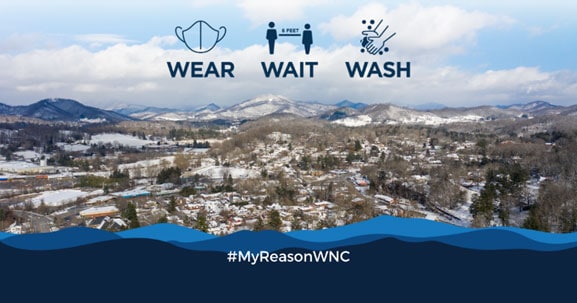
The regional COVID-19 health communications campaign pilot, funded by four different regional partners, showcased local community members sharing their personal motivations for following COVID-19 prevention measures, like hand washing, social distancing, and wearing masks.
The campaign pilot tested how the WNC Health Communicators Collaborative would adapt information from CDC and North Carolina DHHS to create tailored and locally branded COVID-19 health communications and use social media to distribute these health communications to specific rural communities. “Sharing COVID-19 prevention and, later, vaccine messages through social media were more cost effective than purchasing ad space through traditional media. Also, the ability to easily edit and tailor messages as information changed was imperative given the nature of the pandemic,” noted Ms. Ammerman. “Through the use of social media, we could immediately see what was working, what was not working, and quickly examine the metrics to learn what was most engaging for our audiences at local and regional levels.”
Using social media as a tool to reach rural communities did not come without challenges. Local health departments that participated in the campaign pilot were already experiencing increased stress due to the COVID-19 pandemic and couldn’t keep up with the campaign’s high level of social media engagement. Consequently, the Collaborative brought on a local marketing agency, JB Media Group, to help participating health departments set up and manage social media campaigns and address comments – which continued after the campaign’s pilot phase.
As local hospitals and health departments experienced intense capacity issues due to COVID-19, it became clear that the Collaborative needed to engage with community-based organizations and community health workers who were “on the ground” having real-time conversations and outreach with community members throughout the region. “Adding community-based partners and community health workers to the Collaborative was a huge shift and really helpful to our work. Their involvement with the campaign is invaluable,” said Ms. Ammerman.
The pilot campaign covered only five counties, and a “My Reason WNC Partner Toolkit” was developed in both English and Spanish. The Collaborative shared the campaign collateral with other county health departments, hospitals, institutes of higher education, businesses, and other interested parties. Simple and free templates were shared using the Canva platform, which allowed other organizations to adapt and brand materials to share. The toolkit increased community capacity by providing guidance, tutorials, and technical assistance on how to use these resources.
“My Reason WNC” Collaborative Regional COVID-19 Communications Campaign
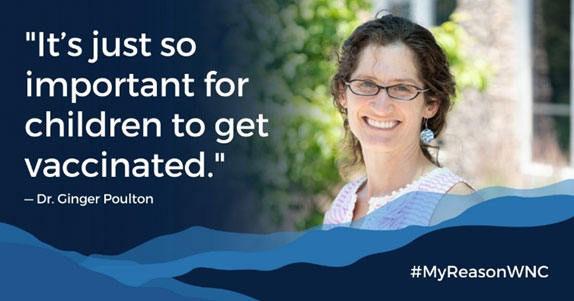
After the successful completion of the regional COVID-19 communications campaign pilot, along with a funding commitment from Dogwood Health Trust, the WNC Health Communicators Collaborative hosted a webinar to present its findings to regional partners. During the webinar, the Collaborative shared their vision for an expanded regional health campaign to include COVID-19 vaccine messaging and an outline of how the campaign would work. Campaign objectives included
- Providing information on COVID-19 vaccine safety, prioritization, and access;
- Encouraging WNC residents to get vaccinated; and
- Reaching vaccine-hesitant communities through storytelling and resources.
Campaign participation immediately grew from a five-county pilot to 16 of the 18 catchment area counties, the Eastern Band of the Cherokee Indians, and several local community-based organizations that closely work with African American and Hispanic/Latinx populations in the WNC region. The “My Reason WNC” collaborative regional health communications campaign officially launched in December 2020, and the remaining two counties joined later. Ms. Ammerman was invited to participate on the North Carolina DHHS COVID Vaccine Communications Advisory Group as a representative of the WNC Health Communicators Collaborative. Her addition allowed for a bi-directional sharing of COVID-19 communications research, best practices, and ideas.
Continuous Listening
A key element in the Collaborative’s success has been ongoing attention to what community members are reacting and responding to and what information they are seeking. The WNC Health Communicators Collaborative meets bi-weekly to assess what they are seeing and hearing in their communities. WNC Health Network has set up work sessions with community-based organizations, community health workers, and university student health advisors to explore where supportive messages are needed and what approaches have the potential to be most effective. As the focus has shifted to speak to those who have been most hesitant about getting the vaccine, the Collaborative hosted virtual and in-person listening sessions and interviews with vaccinated individuals who were late adopters to explore what finally motivated them. These events also featured parents who make decisions about whether to vaccinate their children.
“Regional Storytellers”
Conversations with partners and listening-session data underscored that using local individuals with whom community members can relate was compelling in this complicated communication environment. An important aspect of the “My Reason WNC” campaign is the “Regional Storytellers,” a group of amateur and professional photographers and videographers who are embedded in communities across the region. These storytellers are responsible for collecting and filming stories from local community members and leaders about their reasons for practicing COVID-19 prevention measures and getting vaccinated. “We live in a unique rural Appalachian part of the state and having those messages that are tailored to specific community members is so much more effective. People feel a lot more included, and we have been able to make the campaign more equitable,” said Janelle Messer, Health Education Supervisor at the Jackson County (NC) Health Department, and one of the lead campaign participants for the “My Reason WNC” Campaign. The videos have been shared across social media and YouTube, resulting in millions of views. These collected stories serve as the backbone of the “My Reason WNC” campaign.
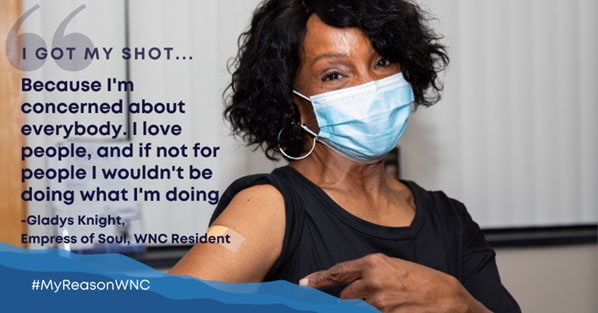
The “Regional Storytellers” were instrumental in creating more than 120 video public service announcements (PSAs) from local messengers in WNC. Music is a cherished part of WNC’s culture, and we were fortunate to feature several local musical talents as messengers to the campaign, including the “Empress of Soul” and multiple Grammy Award-winning singer, Gladys Knight. Ms. Knight’s PSA, released in March 2021, highlighted her reasons for getting the COVID-19 vaccine and encouraged the African American community in WNC to get vaccinated. Although celebrity engagement was not a priority in the “My Reason WNC” campaign, the Collaborative was thrilled when the famed soul singer offered to participate. “Ms. Knight is amazing, and I got to be there when she received her vaccine. She is a global superstar but cares deeply for her WNC community!” said Ms. Ammerman.
Campaign Success
The WNC Health Communicators Collaborative developed and deployed three public evaluation surveys to measure the campaign’s success and the extent to which the campaign impacted local community members’ COVID-19 prevention and vaccination behavior. What they learned suggests that the campaign was shaping people’s attitudes and behaviors toward prevention of COVID-19. Of the survey participants who saw the “My Reason WNC” campaign ads
- 53% said they sought more information about COVID-19 after seeing them.
- 25% said the ads affected their COVID-19-related prevention behaviors; and
- 30% said they led to vaccination or vaccine consideration.
The public evaluation surveys also found that respondents who saw and interacted with the “My Reason WNC” ads were 81% more likely to report some change in COVID-19-related behaviors and 62% more likely to report that the ads led them to consider or get a vaccine. Based on the survey results and high social media engagement, it is safe to say that the “My Reason WNC” campaign has been effective in creating infrastructure, relationships, and capacity in WNC to do high quality health communications. “The fact that we are doing the health communications campaign as a region lightens the load for everyone. We are able to do a campaign that is really robust, measurable, evidence-based, and, at the same time, we are building local capacity to more effectively reach those we serve,” stated Ms. Ammerman.
Lessons Learned and Looking Ahead
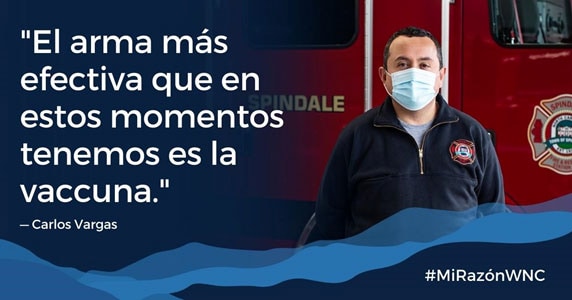
The “My Reason WNC” campaign fostered regional collaboration and up-to-date, consistent COVID-19 messaging throughout WNC. “The reason the campaign worked so great for our community is because we featured locals in our communications and used the right cultural and linguistic messages to engage our diverse populations. Having that personal touch helped to enhance community participation,” said Mrs. Messer.
Lessons learned include the following:
- Engage regularly and frequently with our communication partners to enable our messages to be relevant and impactful
- Use positive messaging that promotes unity and avoid messaging that is threatening, punitive, or fear-based
- Co-create tailored messaging using local messengers and branding to increase engagement
- Ensure videos are highly engaging across all platforms.
- Ensure Spanish-language ads that direct to Spanish-language healthcare websites perform well
- Engage with diverse partners to support communication efforts with communities of color and rural residents
- Take the time to develop templates and tools to enable regional communicators to adapt and/or create materials relevant to their communities to build capacity for more effective communication
Eleven counties recently contributed local health agency funds to support the extension of the regional “My Reason WNC” campaign through the spring of 2022, and there is great interest in continuing this work beyond the pandemic. Ms. Ammerman states, “As a regional communications collaborative, we are really interested in how we can integrate COVID-19 communications into our local and regional community health improvement process and tie it in with other health issues that are important in our region, like substance use disorder and mental health.”
For more information about the “My Reason WNC” campaign, visit www.wnchn.org/myreasonwnc/.
What are you, your health department, or your organization doing to support COVID-19 vaccination in your community? Share your story with communityfeatures@cdc.gov and you could see it on our COVID-19 Vaccine Community Features page.
